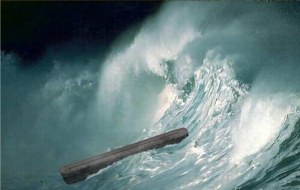 The apostle Paul once described a vital part of his ministry this way: “We use God’s mighty weapons, not worldly weapons, to knock down the strongholds of human reasoning and to destroy false arguments. We destroy every proud obstacle that keeps people from knowing God. We capture their rebellious thoughts and teach them to obey Christ.” (2 Corinthians 10:4-5 NLT)
The apostle Paul once described a vital part of his ministry this way: “We use God’s mighty weapons, not worldly weapons, to knock down the strongholds of human reasoning and to destroy false arguments. We destroy every proud obstacle that keeps people from knowing God. We capture their rebellious thoughts and teach them to obey Christ.” (2 Corinthians 10:4-5 NLT)
Of course, he wrote it in Greek and he might have considered the simplified English of the New Living Translation a bit elementary. For the record, I always view the New Living Translation as what the Bible would read like if James (whose own book is notably blunt) wrote the whole thing. At any rate, you can see what Paul is getting at here. He argued, debated, and took on the rigorous task of making the case for Jesus. He believed in truth -not manufactured truth but the actual stuff that can hold up under examination. In fact, Paul called out other ideas as “false” and “proud” and threw water on mere “human reasoning,” pointing out that it sometimes “keeps people from knowing God.”
Just to keep myself out of trouble, I’ll mention the old English of the King James Version says things like “Casting down imaginations, and every high thing that exalteth itself against the knowledge of God.”
Whatever version you prefer, the bottom line is human reasoning, arrogance, false arguments, etc… need to be challenged. In love? Yes of course, but challenged all the same because this doesn’t end with the latest “scientific” finding, or the latest politically correct phrase to substitute for “baby” when describing an abortion. Those severed arms and legs are fetal tissue. That brain is a product of conception. That liver is a clump of cells.
The human race is increasingly good at fooling itself, of building layer upon layer of assumptions and what New Testament generously called “lies” to the point that down becomes up, good becomes evil, female becomes male or whatever, and we all feel pretty smug about how intelligent we are.
And to be honest, none of us are immune. We all have to guard against this no matter who we are or what we believe. Assumptions are insidious things that lie dormant until someone comes along and shakes things up.
That brings me to Jeff Schweitzer. Frighteningly, Schweitzer is an actual scientist and former White House Senior Policy Analyst with a Ph.D. in marine biology/neurophysiology. Recently, the Huffington Post published his article “Earth 2.0: Bad News for God.” in which he goes on the offensive against God. He explains that soon we will likely prove that life exists on other planets such as the recently discovered Kepler-452b and this will deal a decisive blow against all religions because it destroys fundamental truths the Bible teaches. Yes it’s true that the Bible isn’t the book of choice for many religions, but Schweitzer was evidently making an example of the Bible by taking it out to the woodshed.
He made his point with some of the usual tactics of modern atheism, throwing up various false claims including that the Bible claims the earth is the center of the universe (it does not), that because God did not tell Adam and Eve about other worlds then in effect the Bible teaches there can’t be other worlds (a strained argument to say the least), and that God couldn’t have created light on the earth because the stars were already there. (Which of course assumes a number of things including that the stars could be seen from earth at the time.) He took a statement from a Roman Catholic Pope and made it binding to what all Christians must believe, and he prepped his readers with the assurance that the discovery of life will undermine all religion -even if they make excuses for it after the fact.
All of this, an attack on the beliefs of millions of people that God exists, that Jesus loves them, and that there is hope of eternal life, came from a discovery of a planet that is earth-like? With all due respect this is where I draw the line. This is where it’s time to challenge the ever-increasing layers of what Paul would call mere human reasoning and false arguments. Why? Because I want to enjoy a new planet for crying out loud. I grew up watching Star Trek on television and at the cinema, too. I want to be excited about Kepler-452b (who names these things?) but now I’m supposed to be threatened. When I was younger, people hadn’t even found one planet. I always hoped they would, and now that we are finding them we have to listen to these attacks?
Fine. Have it your way.
The Bible doesn’t say anywhere the earth is the center of the universe.
The Bible doesn’t say we are alone in the universe.
But we probably are.
I say probably because without intelligence behind it, there’s virtually zero probability on the side of the appearance of life on any planet, anywhere. We don’t even know how it started here, and hey, I’m just repeating what Dawkins said.
How does Schweitzer not know the number of galaxies and planets out there is no where near, not even close, to the number needed to have the slightest infinitesimal chance to have life? If you think all we need is one in a million, well that many chances take place all over the earth and new forms of life aren’t springing up anywhere. If you think it happens one in a billion, billion, billion, trillion… you’re still not even close yet.
Planets? You don’t even have enough “events” (elementary logical operations) since the Big Bang 13.7 billion years ago. Dr. Don Batten explains in detail that the chance of getting one small amino acid chain together, just using the various combinations possible, results in a chance of 1 in 10 (to the) 195 power. And that’s just one amino acid chain. You need a zillion other things for life to appear by chance. Mathematician Fred Hoyle determined that the chances of inanimate matter becoming life worked out to 1 in 10 (to the) 40,000 power. Way back in the day, atheist biophysicist Harold Morowitz came up with an even worse probability of 1 in 10 (to the) 10,000,000,000 for a simple bacteria to emerge.
How big are those numbers? Well the number of ATOMS in the universe is 1 in 10 to the 82 power. That’s the higher estimate. So quite literally, there is a better chance of putting an “X” on an atom and letting it float in the universe for a billion years, then going out into the universe (pick any of the billion galaxies you want) and plucking a single atom and get THAT ONE on the first try, than there is of life appearing by accident.
In other words, there may be a billion planets but the chances are statistically zero that life forms all by itself. If we think we can find life on the very first planet we check with odds like that, well… the powerball lottery should be a cinch.
It led Hoyle to remark: “It is big enough to bury Darwin and the whole theory of evolution. There was no primeval soup, neither on this planet nor any other, and if the beginnings of life were not random, they must therefore have been the product of purposeful intelligence.”
So probably… there simply aren’t enough planets, 13.7 billion years is not enough time, and there aren’t even enough atoms. In fact, the numbers say it is flat out statistically impossible for life to appear without anything guiding it.
Like a Designer for instance.
Our human reasoning, our pride, our false arguments need to be challenged. They keep us away from God if left unchecked, and well… they keep us from seeing the obvious. We are not here by accident.










 There are two groups of Christians who believe that the universe was created by God. The group that believes He did it in 6 actual days just a few thousand years ago, and the group that believes God did it billions of years ago. Both groups often claim to interpret the Bible straightforwardly because the Bible never specifically says how old the earth is. Thus it becomes a question over who has the proper interpretation. An argument usually ensues over the Hebrew word “yom,” possible gaps of time, how long the seventh day actually lasted, and more.
There are two groups of Christians who believe that the universe was created by God. The group that believes He did it in 6 actual days just a few thousand years ago, and the group that believes God did it billions of years ago. Both groups often claim to interpret the Bible straightforwardly because the Bible never specifically says how old the earth is. Thus it becomes a question over who has the proper interpretation. An argument usually ensues over the Hebrew word “yom,” possible gaps of time, how long the seventh day actually lasted, and more.
